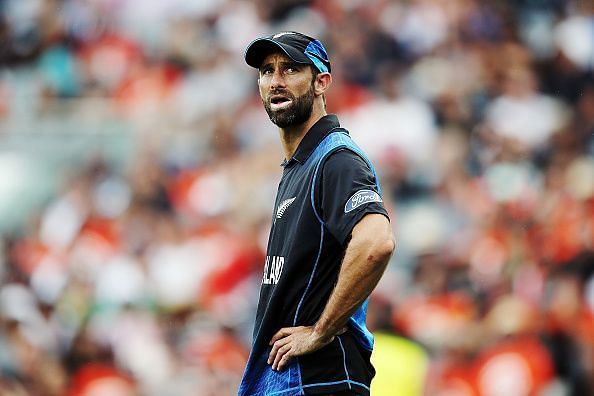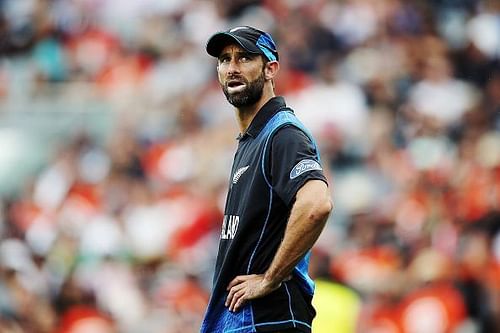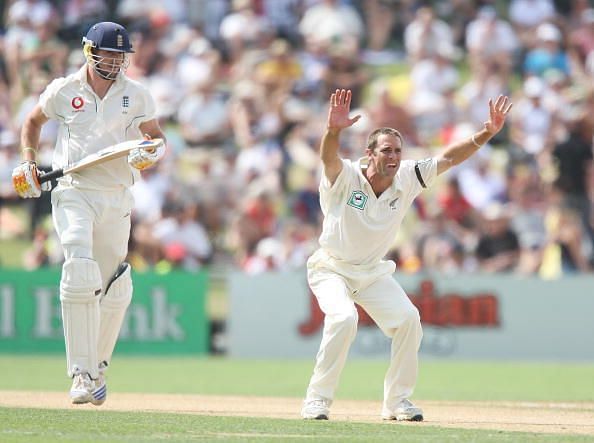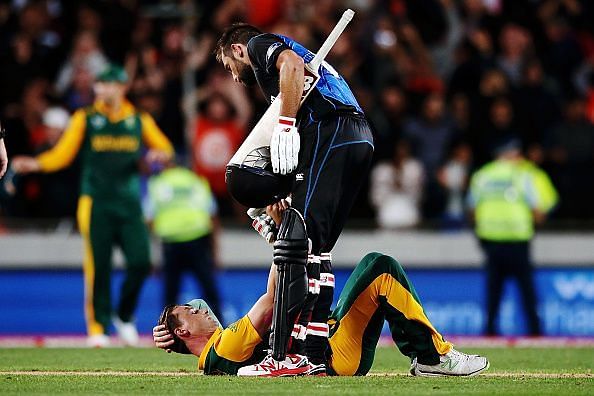
"I could have retired many, many times": Interview with Grant Elliott, Kiwis' overnight World Cup hero

Let us start with the six.
It was a sweet strike, sent perhaps to that part of the ground where aerial hits frequently go. It was the key to New Zealand's entry into their maiden World Cup final, it was the pulverization of yet another South African dream, but buried under all these headlines, it was personal vindication for the Johannesburg-born Grant Elliott.
Elliott was a journeyman. He wasn't as flamboyant as some of his peers in the New Zealand team, nor was he a sleep-inducing stonewaller. He was a quintessential team player, an under-appreciated asset in a team laden with sparkling cricketers. He won't be remembered for steep statistical bar-graphs or bulging trophy cabinets, heck he started playing international cricket only when he was 29 and was done before he turned 37.
But far more importantly, Elliott was a big-match cricketer, an X-factor so badly needed in crunch situations. He became New Zealand's overnight hero at the age of 35, and he knew how to be one.
"I loved the build-up to big games. I always told myself that big players stand up in big games. I always wanted to be the one to take my teammates over the line. Getting a sense of real excitement and realizing what a great opportunity it was to be representing your country in big games was enough motivation."
Laden with various commitments these days, Elliott is a hard man to catch. He's one of the ambassadors for the ongoing U-19 World Cup in his adopted home. In an exclusive interview with Sportskeeda, Elliott reminisces his own experience of playing the junior World Cup, how things changed post that, and finally, the one shot that made him a piece of history.
Just before Dale Steyn strode into the popping crease, Elliott hopped half a step to the right, covering all three stumps behind him. He had predicted the length. Out came the baseball swing and the ball vanished.
He could seldom have predicted his own career path.
Born in South Africa, Elliott progressed to play the U-19 World Cup for the team in 1998, held in his country of birth.
The tournament was bustling with young talent (and future greats) like Chris Gayle, Virender Sehwag, and Harbhajan Singh. Elliott played in the same team as then soon-to-be South African internationals Jacques Rudolph, Robin Peterson and Morne van Wyk.
"It was a great experience. I think the thing I gained most from it was that I was hungry for international cricket. We were treated like professionals: I loved the travel, the training, the team culture and also the televised games. U-19 cricket gave you a taste of the international stage."
While quite a few from the 1998 batch graduated to play Test cricket soon, Elliott was busy changing countries, after a roadblock stalled his progress in South Africa.
"Ken Rutherford gave me some advice about moving once I had a contract dispute with Gauteng Cricket. It was a dispute that forced me out of South Africa Cricket, one they admitted being guilty of. I had to choose where to play next. It was between New Zealand and Australia."
Elliott arrived in Kiwiland in 2001 but took more than a while to be noticed. There must have been times when he would have seen his '98 batchmates make merry in international cricket. Was it, at any point, disheartening enough for him to question his very pursuit?
"Everyone develops at different stages. It's hard to describe what kept me going, I could have retired many, many times but there was a passion from the age of 12 which kept me wanting to play on the international stage ever since I watched South Africa play against the Aussies in the '92 World Cup."
"My Mum let me stay home to watch the game and I got suspended from school cricket because of it. It was worth it though. Thanks, Mum!"
Way before 'Mum' gave him the green signal to watch cricket, it was his brother who introduced him to the game.
"I started playing cricket at the age of 4-5 in the garden with my brother. I bowled leg spin and he used to smoke me out of the garden, so I changed to pace bowling with a taped ball."
"My parents for life and cricket were Jackie McGlew, Andrew Kramer, John Ridgeway and I love training with and watching Darryl Cullinan bat."

It took 24 years from that point, but the big break came against England in a Test series in 2008, and Elliott played 105 international games thereafter, representing the team in the 2009 World T20, multiple Champions Trophies as well as the 2015 World Cup.
He played under two New Zealand superstars, Brendon McCullum and Daniel Vettori.
"Brendon and Daniel were outstanding performers. They both led from the front with their performances. It wasn't all hot air; their leadership was action based and they both always put the team/country before themselves. They were inspirational leaders."
One of the proteges of McCullum and Vettori is today growing rapidly in stature, competing with the best batsmen in the world. Kane Williamson is part of the 'fab-four', a quartet of young batsmen that have no apparent weakness in their batting technique.
"All are susceptible to a 140 kph ball which pitches on leg and hits the top of off," jokes Elliott.
"Kane Williamson, what a great man! What counts for me is their character, I can't fault Kane's, he is an impressive person. I don't know about the others, but obviously they're quality players," he adds.
While Williamson has been proficient in all three formats, Elliott himself slowly evolved into a proven T20 specialist as his own career progressed. For someone who has played the game before the 20-20 era, Elliott genuinely believes that Test cricket is dying.
"Of course, you just have to see broadcast numbers diving in Tests. People don't have time to sit and watch a sport for 5 days. It's a shame but that's the reality. T20 is here to stay and we are even seeing T10 pop up now."
"I can't wait to see the first ambidextrous batter who faces up both left and right-handed. We have already seen the Qalandars uncover an ambidextrous pace bowler in their talent hunt. I love watching the skill level of the batters and look forward to helping future T20 batters hone their striking skills."
Nevertheless, Elliott became a T20 merchant, and has, till date, eight 100s in the shortest format. From BPL to CPL, Elliott played everywhere, even as he announced his international retirement in 2016, a year after the Auckland heroics.
His famous bat-drop celebration after his six in the last over of a PSL game also became an internet rage.
"Like Kenny Powers said 'When you bring the thunder, you sometimes get caught in the storm'. I got caught in the moment!".
Another gesture from him, a soberer and a far more iconic one, came at Eden Park, the night he became New Zealand's Chevalier in black.
As Steyn lay on the ground, distraught, an exulting Elliott, after having let off steam, walked to the South African pacer and offered him a hand, a picture that was framed in black and white as one of the most iconic in the history of the Cups.

"I cant remember what I said to him, but having lived in South Africa till I was 23, I lived through the heartache and bizarre nature of the '92, '99, 2003 World Cup exits. I put myself in their position and realised how broken they were."
Two years later, he announced his full international retirement, opting to play in England on a Kolpak deal. His parting tweet, complete with a photograph with Tim Southee and Kane Williamson, highlighted the imprint of his quiet but radiant nature on the Black Caps.
His philosophy towards the game was uncomplicated, just like his playing style.
"It's only a game and we need to put it into perspective. It's the friendships we make that leave a legacy, not the innings we play."